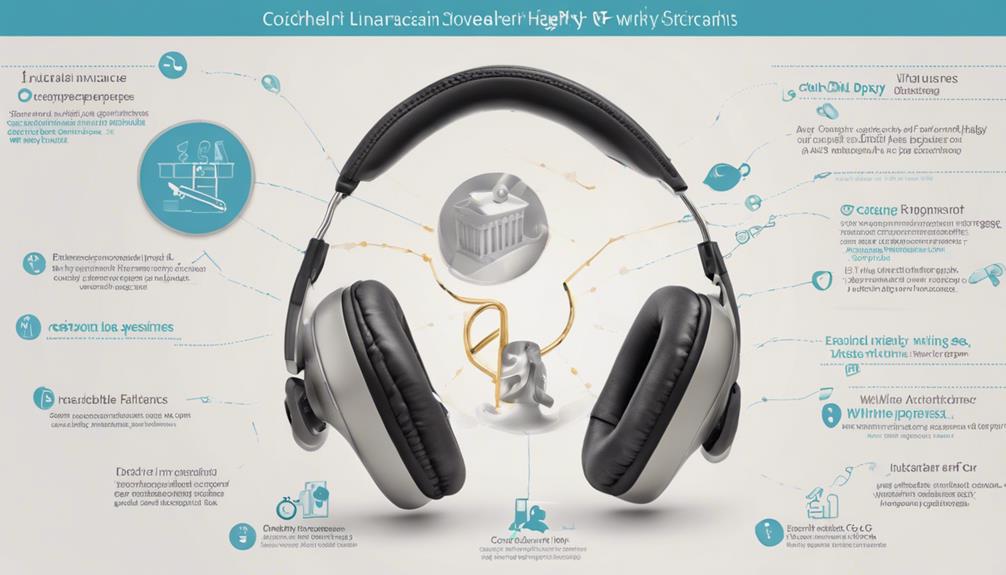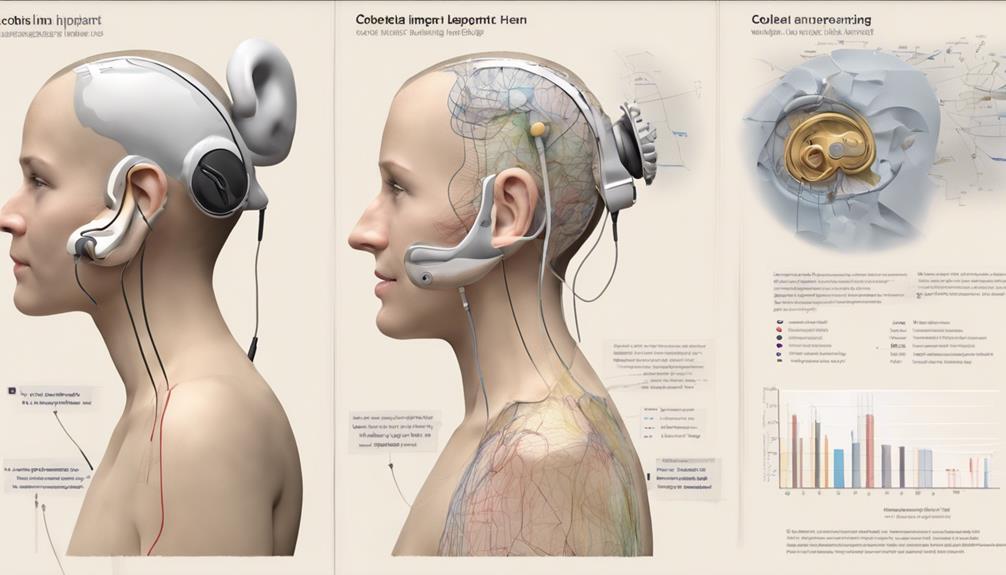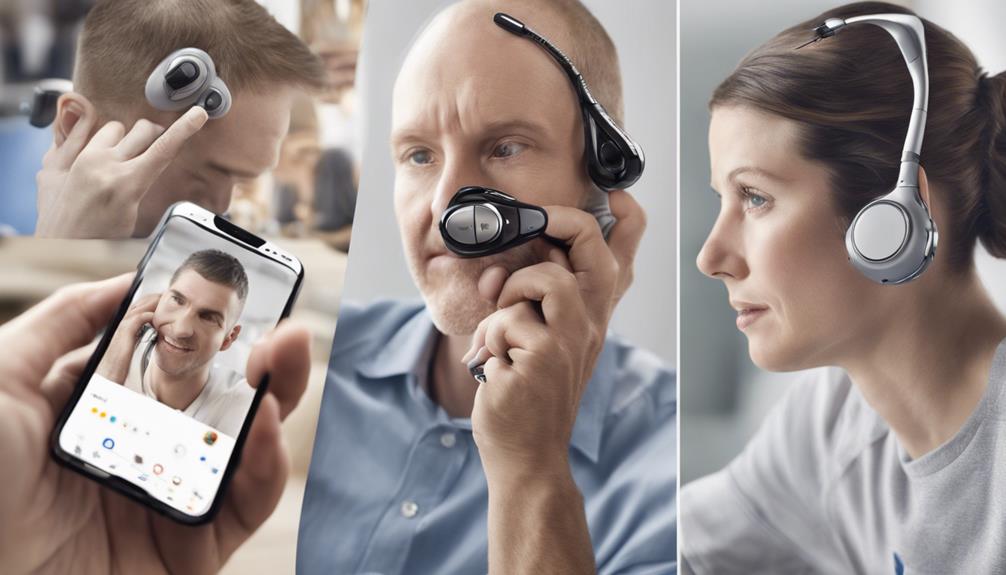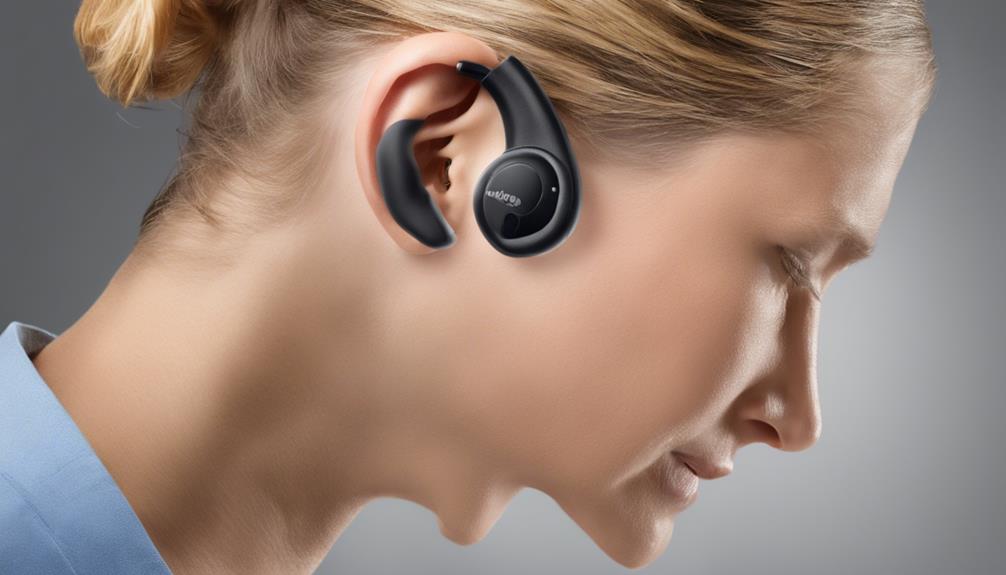Cochlear Implants
How Much Do Cochlear Implants Cost With Insurance?
Unravel the enigmatic world of cochlear implant costs with insurance, where financial clarity remains just out of reach.

Venturing into the financial intricacies of cochlear implant expenses with insurance coverage is like navigating a complex maze, where finding clarity can be as challenging as discovering a secret treasure.
The intricate web of insurance policies, coverage limitations, and out-of-pocket expenses can leave one pondering the true extent of financial predictability in such circumstances.
The journey to unraveling the mysteries of cochlear implant expenses with insurance unveils a landscape influenced by various factors, each holding the key to a different aspect of cost dynamics.
Key Takeaways
- Medicare covers 80% of cochlear implant costs, leaving patients responsible for the remaining 20%.
- Most private insurance plans, Medicaid, and VA programs contribute to covering cochlear implant expenses.
- Understanding insurance nuances like coinsurance, copays, and deductibles is vital for accurate cost estimation.
- Assistance programs are available for those with inadequate insurance coverage, helping to minimize financial responsibilities.
Understanding Cochlear Implant Costs
How do the costs of cochlear implants vary, and what factors influence these variations?
The total cost of cochlear implants typically falls between $50,000 to $100,000, with insurance coverage playing a crucial role. Private insurance companies, Medicare, and Medicaid generally offer some coverage for cochlear implants, although the extent of coverage can vary. Medicare, for instance, usually covers 80% of the costs for eligible candidates, leaving beneficiaries responsible for the remaining 20% along with potential out-of-pocket expenses like coinsurance, copays, and deductibles.
Factors such as location, insurance coverage specifics, and choosing in-network providers can all influence the final out-of-pocket expenses for individuals receiving cochlear implants. While insurance can help alleviate a significant portion of the costs, there may still be financial responsibilities for the patient. Fortunately, assistance programs exist to support those without adequate insurance coverage, ensuring that individuals can access this vital technology without excessive financial burden.
Factors Influencing Cost Coverage

Factors influencing cost coverage for cochlear implants include the type of insurance plan, the location of the individual, and the network status of healthcare providers. When considering insurance coverage for cochlear implants, several key factors come into play:
- Insurance Plan Details: The specifics of the insurance plan, such as coverage percentages, deductibles, and out-of-pocket costs, greatly impact the overall cost coverage for cochlear implants.
- Location: The geographical location of the individual can influence the availability of in-network providers and the cost of services related to cochlear implants.
- Post-Surgery Care: Factors like post-surgery rehabilitation, implant programming, and follow-up care are essential elements that can affect the total cost coverage by insurance.
Understanding these factors is vital for individuals seeking cochlear implants to estimate their out-of-pocket expenses accurately and navigate the complexities of insurance coverage effectively. By considering these aspects, individuals can make informed decisions regarding their implant procedure and associated costs.
Insurance Options for Cochlear Implants
When exploring insurance options for cochlear implants, understanding the coverage provided by private insurance companies, Medicare, and Medicaid is crucial for managing out-of-pocket costs effectively. Most private insurance companies, Medicare, and Medicaid offer coverage for cochlear implants, assisting in reducing patients' expenses. Medicare typically covers 80% of the cost for eligible candidates, with patients responsible for the remaining 20% through coinsurance, copays, and deductibles. Medicare Supplement plans and Medicare Advantage plans can impact coverage details for cochlear implants, providing additional payment options for beneficiaries. Additionally, over 90% of private insurance plans, Medicaid, and Veterans Administration programs contribute to covering the costs associated with cochlear implants, ensuring financial support for patients. Private insurance plans often cover follow-up care extensively, although the specific coverage details and costs may vary based on the insurance provider, plan details, and location.
| Insurance Options | Coverage Details |
|---|---|
| Private Insurance Plans | Vary based on provider, extensive follow-up care coverage, costs may vary |
| Medicare | Typically covers 80%, beneficiaries responsible for 20%, coinsurance, copays, deductibles |
| Medicaid | Assists in covering costs, financial support for patients |
| Medicare Supplement Plans | Alters coverage details, offers additional payment options for beneficiaries |
| Veterans Administration | Contributes to covering costs associated with cochlear implants, ensuring financial support |
Cost Breakdown With Insurance

Exploring the breakdown of costs with insurance coverage for cochlear implants reveals key financial considerations for patients. When navigating the expenses associated with cochlear implants, understanding the nuances of insurance coverage is essential.
Here is a brief overview of the cost breakdown with insurance:
- Medicare Coverage: Medicare typically covers 80% of the costs for eligible candidates, leaving beneficiaries responsible for the remaining 20%. It's crucial for individuals to comprehend what Medicare will cover and what out-of-pocket expenses may remain.
- Medicaid Coverage: Medicaid, along with most private insurance companies, often covers at least a portion of the total costs associated with cochlear implants. Patients should verify their specific coverage details to anticipate any financial responsibilities.
- Assistance Programs: For those without insurance coverage, various assistance programs exist to help alleviate the financial burden of cochlear implants. These programs can offer vital support in making these life-changing devices more accessible.
Understanding coinsurance, copays, and deductibles in conjunction with insurance coverage is paramount for patients seeking cochlear implants.
Maximizing Insurance Benefits
To optimize insurance benefits for cochlear implant coverage, understanding the nuances of individual plans and available assistance programs is crucial. Medicare typically covers 80% of cochlear implant costs, with beneficiaries responsible for the remaining 20%. Medicare Supplement plans and Medicare Advantage plans can influence coverage details for cochlear implants. Private insurance plans, Medicaid, and the Veterans Administration help cover over 90% of the costs associated with cochlear implants, although coverage specifics can vary based on the provider, plan details, and location.
It's essential to comprehend insurance benefits and costs to maximize coverage for cochlear implant procedures effectively. By familiarizing oneself with the coverage details of different health insurance options and exploring available assistance programs, individuals can ensure they're making informed decisions regarding their hearing health and implant needs. Taking proactive steps to understand insurance benefits can lead to more comprehensive coverage and reduced out-of-pocket costs for cochlear implant recipients.
Frequently Asked Questions
Does Insurance Cover Cochlear Implants?
Insurance typically covers cochlear implants, with most private insurance companies, Medicare, and Medicaid offering some coverage. Medicare often pays 80% for eligible candidates, leaving patients responsible for the remaining 20%.
Additional expenses like coinsurance, copays, and deductibles may apply, but assistance programs are available for those without insurance. Coverage details vary among insurance plans, with private insurance usually offering extensive follow-up care coverage that varies based on the provider, plan, and location.
How Much Do Cochlear Implants Cost in the Us?
Let's delve into the cost of cochlear implants in the US. Prices typically range from $50,000 to $100,000. Factors like location and insurance coverage influence the final cost.
Medicare usually covers 80% for eligible individuals, leaving patients responsible for the remaining 20%. Additional expenses like coinsurance and deductibles might apply. Assistance programs exist for those without insurance.
It's vital to consider these factors when budgeting for a cochlear implant.
How Much Does It Cost to Get a Cochlear Implant With Medicare?
Getting a cochlear implant with Medicare can cost beneficiaries 20% of the Medicare-approved amount, as Medicare typically covers 80% of the expenses.
Additional coverage from Medigap plans can reduce out-of-pocket costs.
Medicare Advantage plans may offer different coverage options for cochlear implants.
This financial assistance provided by Medicare is crucial for individuals who need cochlear implants.
Do Cochlear Implants Give 100% Hearing?
Cochlear implants don't provide 100% hearing restoration. They vary in the level of hearing improvement based on individual factors.
These implants can significantly enhance understanding of speech in quiet settings and improve communication abilities. While not replicating natural hearing, they grant access to sounds, elevating the quality of life for those with severe to profound hearing loss.
Conclusion
In conclusion, the cost of cochlear implants with insurance coverage can vary greatly, but it's generally a significant financial investment.
One interesting statistic to consider is that Medicare typically covers 80% of the costs for eligible candidates, leaving beneficiaries responsible for the remaining 20%.
Understanding the factors influencing cost coverage and maximizing insurance benefits can help individuals navigate the expenses associated with cochlear implants.
Jamie is one of the creative forces behind the words that resonate with our audience at Deaf Vibes. With a passion for storytelling and advocacy, Jamie delves into topics that matter deeply to the deaf and hard-of-hearing community. Jamie’s articles are crafted with empathy, insight, and a commitment to positive change, from exploring the latest advancements in hearing technologies to shedding light on the everyday challenges and victories of those within the community. Jamie believes in the power of shared stories to inspire action, foster understanding, and create a more inclusive world for everyone.
Cochlear Implants
Where Does Cochlear Implants Near Me: A Comprehensive Guide
Bask in the intricacies of cochlear implant services near you, uncovering a wealth of information that promises to revolutionize your understanding of auditory health.

In the extensive array of healthcare choices, locating the perfect match for cochlear implants is comparable to looking for a needle in a haystack. We’ve all experienced the struggle of sorting through the labyrinth of services and providers, pondering which direction to head in for the most up-to-date and trustworthy data on this crucial element of hearing health.
But fear not, as we embark on a journey together to unravel the mysteries surrounding the availability and nuances of cochlear implant services near you. Let's shed light on this intricate topic and explore the comprehensive guide that awaits us.
Key Takeaways
- Research local providers specializing in cochlear implants for comprehensive evaluation and care.
- Evaluate candidacy through thorough hearing tests to determine if implants are the best solution.
- Seek financial assistance programs and patient reviews when selecting a provider for cochlear implants.
- Gain insights from educational resources to understand the cochlear implant process and its benefits.
Understanding Cochlear Implants Basics
Understanding the basics of cochlear implants is crucial for individuals considering this form of treatment for hearing loss. Cochlear implants are sophisticated electronic devices designed to stimulate the cochlear nerve directly, aiding in sound perception.
Unlike hearing aids, which amplify sounds, cochlear implants work by capturing sounds through an external microphone and transmitting them to an internal component surgically placed beneath the skin. This implant doesn't restore normal hearing but significantly enhances hearing and speech understanding, especially for individuals who struggle with speech comprehension even with hearing aids.
It's essential to note that cochlear implants are FDA-approved for specific criteria, and their effectiveness varies from person to person. Before undergoing cochlear implant surgery, individuals should consult with an ear, nose, and throat specialist to determine if they're suitable candidates for this intervention.
Finding Local Cochlear Implant Providers

Exploring options for local cochlear implant providers can be facilitated by utilizing online directories or contacting prominent hospitals and medical centers in your vicinity. When seeking the best provider for cochlear implant services, consider the following:
- Research Local Providers: Look for clinics that have experienced professionals specializing in cochlear implants. Ensure they offer comprehensive services from evaluation to post-implant care.
- Check Patient Reviews: Investigate patient feedback to gauge the quality of care provided by different local providers. Positive reviews can indicate a satisfactory experience and successful outcomes.
- Explore Financial Assistance Programs: Some local providers may offer financial aid, insurance coordination, or counseling services to assist patients in managing the costs associated with cochlear implants. Understanding these programs can help alleviate financial concerns during the treatment process.
Evaluating Cochlear Implant Candidacy
Assessing eligibility for cochlear implants involves a series of thorough hearing tests to determine candidacy based on speech understanding abilities and hearing levels with and without aids. These evaluations are conducted by a specialized cochlear implant team to assess the inner ear's function, specifically the cochlear nerve's ability to transmit sound signals to the brain. Hearing aids are typically worn during these tests to evaluate the extent of hearing loss and to determine if cochlear implant surgery is the best course of action.
During the evaluation process, speech understanding abilities are carefully assessed to gauge how well a person can comprehend speech in various environments. This assessment helps the cochlear implant team determine if the individual's hearing loss is severe enough to warrant the use of a cochlear implant. By thoroughly evaluating these factors, the team can accurately identify candidates who are likely to benefit from cochlear implant technology, paving the way for improved hearing outcomes and quality of life.
Navigating the Cochlear Implant Process

We guide individuals through the comprehensive process of cochlear implantation, from initial evaluations to post-surgery care, ensuring optimal outcomes and continued support. When navigating the cochlear implant process, it's crucial to understand the key components involved:
- Candidacy Evaluations: Before undergoing cochlear implant surgery, individuals will undergo thorough evaluations, including hearing tests, speech understanding assessments, and discussions about realistic expectations. These evaluations help determine if a cochlear implant is the appropriate solution for the individual's hearing loss.
- Surgery: The surgical procedure for cochlear implants is typically performed on an outpatient basis, lasting 3-4 hours under general anesthesia. During the surgery, the implant is placed under the skin behind the ear, and the electrode array is inserted into the cochlea to stimulate the auditory nerve.
- Follow-up Care: Post-surgery, individuals will receive initial stimulation and programming of the device. Regular mapping sessions will be scheduled to adjust the settings for optimal speech understanding. Long-term success with cochlear implants hinges on consistent follow-up appointments and collaboration among specialists to ensure ongoing support and maintenance of the device.
Resources for Cochlear Implant Education
Transitioning to the discussion of 'Resources for Cochlear Implant Education,' individuals can access a wealth of informative materials covering various aspects of cochlear implants, including hearing loss, surgical procedures, and insurance considerations. Educational resources play a crucial role in empowering individuals to make informed decisions about cochlear implantation. These resources delve into the complexities of hearing loss, the intricacies of cochlear implants, and the various surgical options available. Understanding the process from patient experiences shared before clinic visits can alleviate concerns and prepare individuals for what to expect.
Popular educational resources such as 'How Hearing Works' and 'Hearing Loss Explained' provide detailed insights into the science behind hearing loss and the benefits of cochlear implants. Seeking guidance from health professionals is highly encouraged to ensure a comprehensive understanding of the implantation procedure and post-operative care. By utilizing these resources, individuals can equip themselves with the knowledge needed to navigate the journey towards improved hearing health confidently.
Frequently Asked Questions
How Much Will Medicare Pay Toward a Cochlear Implant?
Medicare typically covers 80% of the cost of medically necessary cochlear implant surgery and related services. The remaining 20% can be covered by supplemental insurance or out-of-pocket expenses.
Medicare Part B covers the cost of the cochlear device itself, while Part A covers hospital expenses for the surgery. It's essential for patients to check with their specific Medicare plan to confirm coverage details and any additional requirements.
What Is the Best Hospital for Cochlear Implants in the Us?
When it comes to cochlear implants in the US, top hospitals like Johns Hopkins, Massachusetts Eye and Ear, and Mayo Clinic stand out for their expertise.
These institutions boast skilled surgeons, specialized teams, and cutting-edge facilities dedicated to ensuring successful outcomes.
With a focus on comprehensive evaluation, surgery, and follow-up care, patients can expect advanced technology and a multidisciplinary approach.
These leading hospitals are committed to enhancing the quality of life for individuals with hearing loss.
Do Audiologists Deal With Cochlear Implants?
Yes, audiologists play a crucial role in cochlear implant programs. They assess candidacy, conduct evaluations, and provide pre- and post-implantation support. Working closely with surgeons and speech therapists, audiologists ensure optimal outcomes for recipients.
Responsibilities include programming and fine-tuning devices to meet individual needs, educating on use and care, and long-term management through performance monitoring and addressing concerns.
Audiologists are instrumental in the success of cochlear implantation.
What Is a Cochlear Implant Doctor Called?
We're otolaryngologists or ENT specialists who diagnose and treat ear disorders, including hearing loss. We perform surgeries like cochlear implantation to aid patients with severe hearing loss.
Our collaboration with audiologists, speech therapists, and other experts ensures comprehensive care. Our specialized training equips us to manage various hearing-related conditions effectively.
Trust us for expert care in cochlear implant procedures and other ear health matters.
Conclusion
In conclusion, the journey towards better hearing through cochlear implants is a transformative experience for many.
Did you know that over 324,000 cochlear implants have been performed worldwide, providing individuals with the gift of sound?
With advancements in technology and expert care, the future looks brighter for those seeking improved hearing through cochlear implantation.
Jamie is one of the creative forces behind the words that resonate with our audience at Deaf Vibes. With a passion for storytelling and advocacy, Jamie delves into topics that matter deeply to the deaf and hard-of-hearing community. Jamie’s articles are crafted with empathy, insight, and a commitment to positive change, from exploring the latest advancements in hearing technologies to shedding light on the everyday challenges and victories of those within the community. Jamie believes in the power of shared stories to inspire action, foster understanding, and create a more inclusive world for everyone.
Cochlear Implants
Which Statements in the Debate Over Cochlear Implants Are True?
Intriguing truths and contradictions in the cochlear implant debate invite a deeper exploration of the complexities – but where do the true answers lie?

Navigating the extensive range of views on cochlear implants, we arrive at a junction where the realities might not be as straightforward as we first thought.
As we navigate through the layers of this debate, we are confronted with contrasting viewpoints that challenge our understanding of deafness, technology, and identity.
The intricate interplay between these elements invites us to question the validity of certain statements and explore the nuances that underpin this contentious discourse.
Join us as we reflect on the complexities of the debate over cochlear implants and strive to unravel the truths that lie beneath the surface.
Key Takeaways
- Cochlear implants provide access to sound for severe hearing loss individuals.
- Concerns about eroding Deaf culture and the potential devaluation of sign language.
- High cost and limited accessibility create challenges for equitable access.
- Balancing technological benefits with preserving cultural identity is crucial in the debate.
Historical Background of Cochlear Implants
In the late 20th century, the development of cochlear implants marked a significant technological advancement in addressing severe hearing loss. For individuals who are deaf or have profound hearing loss, cochlear implants represent a groundbreaking solution that can potentially restore a sense of sound. These devices haven't only improved the quality of life for many recipients but have also sparked debates regarding cultural identity within the deaf community.
Cochlear implants have raised complex questions about the intersection of technology and identity, particularly regarding the deaf community's cultural heritage. Some argue that cochlear implants may be seen as a way to fix a perceived disability, potentially undermining the rich cultural identity and history of the deaf community. On the other hand, proponents of cochlear implants view them as tools that can bridge the gap between the deaf and hearing worlds, offering individuals the opportunity to fully engage in both communities.
The development and evolution of cochlear implants have undoubtedly reshaped the landscape of hearing loss treatment, prompting discussions about the nuanced relationship between technology, identity, and cultural belonging.
Efficacy and Impact on Hearing Loss

The efficacy and impact of cochlear implants on hearing loss are significant, as they've been established to provide hearing for individuals with severe hearing impairment.
- Cochlear implants offer a transformative solution for those with profound hearing loss, enabling them to experience sounds and speech that were previously inaccessible.
- By directly stimulating the auditory nerve, cochlear implants bypass damaged parts of the ear, allowing for signals to be sent to the brain and interpreted as sound.
- While cochlear implants don't restore hearing to 'normal' levels, they play a crucial role in enhancing communication abilities and improving quality of life for many individuals with severe hearing impairments.
Through the innovative technology of cochlear implants, individuals who were once isolated by their hearing loss can now participate more fully in conversations, enjoy music, and engage with the world around them. This advancement represents a significant step towards bridging the gap between the deaf and hearing communities.
Ethical Considerations and Criticisms
Considering the ethical implications and criticisms surrounding cochlear implants, the debate delves into complex intersections of identity, culture, and medical intervention. Critics express concerns that cochlear implants may erode Deaf culture by promoting assimilation into the hearing world, potentially devaluing sign language and erasing Deaf identity. There are worries about the medicalization of deafness and whether cochlear implants prioritize medical intervention over cultural preservation. Balancing the benefits of technological advancements with the preservation of individual autonomy and cultural heritage is paramount in this debate.
| Ethical Considerations and Criticisms | ||
|---|---|---|
| Cochlear Implants might erode Deaf culture | Cochlear Implants could devalue sign language | Concerns about medicalization of deafness |
Cost and Accessibility Issues

Cost and accessibility barriers pose significant challenges for individuals seeking cochlear implants, impacting their ability to access this advanced medical technology. When considering the cost implications and availability issues surrounding cochlear implants, it becomes evident that:
- The high cost of cochlear implants can create financial burdens for individuals without adequate insurance coverage, potentially limiting their access to this life-changing technology.
- Disparities in insurance coverage for cochlear implants can result in unequal opportunities for individuals with hearing loss to benefit from this treatment, depending on their insurance plans and financial means.
- Limited accessibility to specialized implant centers in certain regions can further exacerbate the challenges faced by individuals seeking cochlear implants, particularly those from lower socioeconomic backgrounds or areas with restricted healthcare resources.
Addressing these cost and accessibility issues is crucial in ensuring equitable access to cochlear implants for all who could benefit from them.
Future Developments and Research Trends
Exploring future developments and research trends in cochlear implants reveals a promising trajectory towards improving speech recognition, device longevity, music perception, wireless connectivity, and neural interfaces for enhanced effectiveness. Research efforts are concentrated on enhancing speech recognition capabilities in challenging, noisy environments to provide users with better communication outcomes.
Future developments aim to increase the longevity and reliability of cochlear implant devices, ensuring sustained benefits for recipients over time. Studies also focus on improving music perception and appreciation among individuals with cochlear implants, recognizing the importance of a holistic auditory experience.
Advancements in technology may soon offer wireless connectivity options and advanced sound processing features, further enhancing the overall user experience. Additionally, researchers are exploring the potential of neural interfaces to optimize the effectiveness of cochlear implants, potentially opening new avenues for improved hearing outcomes.
These ongoing research trends underscore a commitment to continuous improvement in cochlear implant technology, with a focus on enhancing user satisfaction and quality of life.
Frequently Asked Questions
What Is the Debate About Cochlear Implants?
The debate about cochlear implants centers on their role in addressing deafness and the impact on deaf culture and sign language.
Ethical concerns arise, particularly in children, affecting identity and community ties.
Differing opinions within the deaf community reveal ongoing controversies.
Balancing medical intervention with cultural preservation and individual choices is crucial.
The varied viewpoints in the deaf community contribute to the complex discussion on cochlear implants, identity, and communication.
What Are Some Problems With Cochlear Implants?
Some problems with cochlear implants include risks of infections and device malfunction. Ongoing maintenance and adjustments are necessary for optimal function. People with implants may feel isolated from the deaf community.
Critics argue that cochlear implants prioritize oralism over sign language, impacting cultural and linguistic identity. Despite these challenges, implants can offer life-changing benefits for many individuals.
What Are the Pros and Cons of Having a Cochlear Implant?
Having a cochlear implant can enhance hearing abilities and improve communication skills for individuals with severe hearing loss. However, risks such as infections, device malfunctions, and the need for ongoing maintenance should be considered. While cochlear implants may not restore hearing to 'normal' levels, they can significantly improve the quality of life for those with hearing impairments.
What Is One Argument in Favor of Pediatric Cochlear Implants?
One argument in favor of pediatric cochlear implants is the potential to enhance language development and educational opportunities for children with severe hearing loss.
Early implantation aims to improve social interactions and provide access to auditory information, aiding in better learning outcomes.
Conclusion
In conclusion, the debate over cochlear implants is a complex and multifaceted issue.
While they've proven to be effective in improving communication and quality of life for some individuals with hearing loss, they've also raised ethical concerns and criticisms within the deaf community.
As technology continues to evolve, it's important to consider both the benefits and drawbacks of cochlear implants in order to make informed decisions that respect the diversity of perspectives and experiences within the deaf community.
Jamie is one of the creative forces behind the words that resonate with our audience at Deaf Vibes. With a passion for storytelling and advocacy, Jamie delves into topics that matter deeply to the deaf and hard-of-hearing community. Jamie’s articles are crafted with empathy, insight, and a commitment to positive change, from exploring the latest advancements in hearing technologies to shedding light on the everyday challenges and victories of those within the community. Jamie believes in the power of shared stories to inspire action, foster understanding, and create a more inclusive world for everyone.
Cochlear Implants
Top Phones Compatible With Cochlear Implants: a How-To Guide
Curious about which phones excel in compatibility with cochlear implants? Discover essential features and tips in our comprehensive guide.

Exploring the realm of smartphones and cochlear implants, locating the ideal pairing is comparable to uncovering a rare find within a multitude of choices. The nuances of connectivity and ease of use are essential for improving the auditory experience.
But have you ever wondered which phones stand out as top contenders for seamless integration with cochlear implants? Let's explore the key features and considerations that can make a significant difference in your daily interactions.
Key Takeaways
- iPhones and Android phones seamlessly integrate with various Cochlear sound processors for enhanced communication.
- Direct streaming benefits on compatible devices improve music and phone call experiences for Cochlear implant users.
- Consider battery life when choosing a phone for uninterrupted sound processing and connectivity.
- Cochlear Smart Apps offer support and adjustment features, enhancing hearing settings management for users.
Iphone Compatibility Features for Cochlear Implants
When considering the compatibility features of iPhones for cochlear implants, it becomes evident that iPhones offer a seamless and advanced integration with a variety of Cochlear sound processors. iPhones are compatible with a range of sound processors such as Cochlear Nucleus 8, Nucleus 7, Kanso 2, Osia 2, Baha 6 Max, Baha 5 SuperPower, and Baha 5 Power, providing users with a wide selection to choose from. Direct streaming capabilities for phone calls, music, and podcasts are available with compatible iPhones and sound processors, enhancing the overall user experience. Additionally, iPhone compatibility grants access to Cochlear Smart Apps, enabling users to manage hearing settings and access Remote Care conveniently.
For those seeking enhanced hearing accessibility features, iPhones offer options like live transcription and captions, which can significantly improve usability for individuals with Cochlear implants. These features cater to the diverse needs of users, making communication and media consumption more accessible and enjoyable. In fact, 82% of recipients find direct streaming easier for phone calls with iPhones, highlighting the effectiveness and user satisfaction with this integration.
Android Phones for Cochlear Implant Users

Android phones provide a comprehensive range of features and compatibility options for users with Cochlear implants, enhancing their overall auditory experience. Most current-generation Android phones are compatible with Cochlear sound processors like Nucleus 7 and Kanso 2, offering direct streaming capabilities for phone calls and music. Before purchasing, it's crucial to verify compatibility with specific Android models by consulting Cochlear's compatibility list.
Android phones come in various screen sizes, catering to individual preferences and needs of Cochlear implant users. Additionally, these devices offer accessibility features that can greatly benefit individuals with hearing loss, including live transcription and captions. By exploring these features, users can personalize their experience to suit their unique requirements.
Android phones present a versatile and user-friendly option for Cochlear implant recipients seeking seamless integration and enhanced functionality in their daily communication and entertainment activities.
Direct Streaming Capabilities With Cochlear Implants
Cochlear implant users benefit greatly from the direct streaming capabilities offered by compatible sound processors, allowing seamless access to phone calls, music, and podcasts without the need for intermediary devices. This innovative technology enhances communication and entertainment experiences for individuals with Cochlear implants, offering them a more connected and fulfilling lifestyle.
Key Points:
- Improved Communication: Direct streaming makes phone calls easier for 82% of Cochlear recipients, enhancing convenience and quality of interactions.
- Enhanced Music Experience: 88% of users prefer direct streaming for music, providing a richer listening experience and allowing them to enjoy their favorite tunes with clarity.
- Wide Device Compatibility: Direct streaming is available from most current-generation Apple and Android devices, ensuring that users have a variety of options to stay connected and entertained seamlessly.
Battery Life Considerations for Cochlear Implant Users

Considering the impact of direct streaming activities on Cochlear implant sound processor battery life, it's crucial for users to prioritize devices with sufficient power capacity to minimize frequent recharging interruptions. Good battery life is essential for Cochlear implant users to ensure uninterrupted usage throughout the day, especially when engaging in direct streaming features like phone calls and music.
The battery life of Cochlear implant sound processors varies based on factors such as size, individual usage patterns, and technology power consumption. When selecting a phone for direct streaming with Cochlear implants, it's important to consider the power consumption of the technology to guarantee adequate battery life for users. Inquiring about the expected battery life of compatible smartphones can assist in effectively managing the needs of Cochlear implant users, allowing for seamless communication and sound processing without the worry of constant recharging.
Cochlear Smart App Compatibility With Phones
When exploring the compatibility of Cochlear Smart Apps with smartphones, users can seamlessly manage their hearing settings for enhanced auditory experiences.
- Apple and Android™ devices compatibility: Cochlear Smart Apps are designed to work with a wide range of Apple and Android™ devices, allowing users to easily control their hearing settings on their preferred smartphones.
- Access to Cochlear Remote Care: Through the Smart Apps, users can access Cochlear Remote Care, connecting them with clinicians for support without the need for in-person visits, ensuring timely assistance and adjustments to their hearing settings.
- Verification of compatibility: Before diving into using the Smart Apps, it's crucial to verify compatibility with your specific phone model at www.cochlear.com/compatibility. This step ensures a smooth experience and optimal functionality of the Cochlear Smart Apps on your device.
Frequently Asked Questions
How Do You Use the Phone With a Cochlear Implant?
Using the phone with a cochlear implant involves connecting your sound processor to a compatible smartphone for direct streaming of calls, music, and more. This enhances our communication and music experience.
Smartphone compatibility and Cochlear Smart Apps help manage hearing settings and access support. Consider battery life and screen size for optimal functionality.
Our experience is improved through seamless integration of current-generation Apple and Android devices with Cochlear implants.
How Do I Pair My Cochlear to My Phone?
We pair our Cochlear implants to our phones by turning on the sound processor and activating its pairing mode.
Then, we access our phone's Bluetooth settings, search for available devices, and select our Cochlear sound processor to establish a connection.
Following any on-screen prompts, we complete the pairing process, allowing seamless direct streaming of phone calls, music, and other audio content to our Cochlear sound processor for an enhanced experience.
Can You Bluetooth to a Cochlear Implant?
Yes, we can connect to a Cochlear implant via Bluetooth with compatible sound processors like Cochlear™ Nucleus® 8, Nucleus 7, Kanso® 2, Osia® 2, Baha® 6 Max, Baha 5 SuperPower, and Baha 5 Power. This feature allows for direct streaming of phone calls, music, and podcasts to the sound processor, leading to a more seamless user experience.
It's essential to check the compatibility list at www.cochlear.com/compatibility before attempting to pair your smartphone with a Cochlear implant.
What Must I Avoid Now I Have a Cochlear Implant?
When we've a cochlear implant, we need to avoid exposing it to excessive moisture, strong magnets, impact, extreme temperatures, and harsh chemicals. These actions can prevent damage, interference with function, malfunctions, and ensure optimal performance.
It's crucial to handle our cochlear implant with care and follow these guidelines to maintain its functionality and longevity.
Conclusion
In conclusion, selecting a phone compatible with Cochlear implants is crucial for optimizing your hearing experience. Did you know that over 95% of Cochlear implant users report improved communication abilities with direct streaming capabilities?
By choosing the right smartphone, you can access a world of sound and connectivity. Remember to consider factors such as battery life, app compatibility, and screen size when making your decision. Your journey to enhanced hearing starts with the right technology.
Jamie is one of the creative forces behind the words that resonate with our audience at Deaf Vibes. With a passion for storytelling and advocacy, Jamie delves into topics that matter deeply to the deaf and hard-of-hearing community. Jamie’s articles are crafted with empathy, insight, and a commitment to positive change, from exploring the latest advancements in hearing technologies to shedding light on the everyday challenges and victories of those within the community. Jamie believes in the power of shared stories to inspire action, foster understanding, and create a more inclusive world for everyone.
-

 Navigating the VA System1 month ago
Navigating the VA System1 month agoVA Hearing Loss Rating Chart: Understanding Disability Compensation
-

 Therapies and Interventions5 days ago
Therapies and Interventions5 days ago10 Auditory Processing Goals for Effective Speech Therapy
-

 Vetted1 month ago
Vetted1 month ago15 Best Oticon Hearing Aids to Improve Your Hearing in 2024
-

 Sign Language3 days ago
Sign Language3 days agoMastering the Art of Signing Letters in Sign Language
-

 Navigating the VA System4 weeks ago
Navigating the VA System4 weeks agoUnderstanding Bilateral Hearing Loss VA Rating Criteria
-

 Tinnitus1 month ago
Tinnitus1 month agoVA's Rating System for Tinnitus and Hearing Loss Explained
-

 Sign Language1 week ago
Sign Language1 week agoSign Language Emoji Translator: How to Communicate With Gestures
-

 Sign Language2 months ago
Sign Language2 months agoMedical Sign Language PDF: A Comprehensive How-To Guide

















